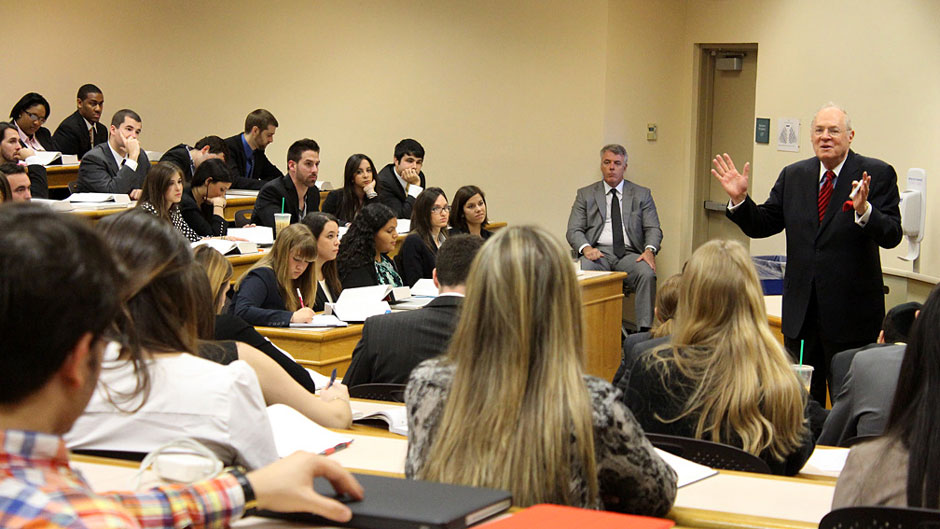The critical swing vote on a sharply divided Supreme Court for nearly three decades, Justice Anthony M. Kennedy sent shock waves around Washington, D.C. and the nation on Wednesday when he announced that he is retiring on July 31.
“It has been the greatest honor and privilege to serve our nation in the federal judiciary for 43 years, 30 of those years on the Supreme Court,” Kennedy, who was nominated by President Ronald Reagan, said in a statement.
The 81-year-old’s decision gives President Donald J. Trump the chance to reshape the ideological makeup of the court for generations to come and immediately leaves the future of U.S. constitutional law in doubt.
A group of University of Miami law and political science professors weigh in on the likely future of the nation’s highest court and the impending confirmation battle for Trump’s next Supreme Court nominee, topics that will undoubtedly dominate judicial and political debates for months to come.
“This moves the court to the right in significant ways,” said Charlton Copeland, professor and the M. Minnette Massey Chair in Law at UM’s School of Law. “It likely moves the court, in some respects, to the right on what I think will be the second-generation questions surrounding LGBTQ issues and equality. And by that, I mean questions that look like the issues that have arisen in the Masterpiece case [in which the Supreme Court ruled in favor of a Colorado baker who had refused to create a wedding cake for a gay couple].”
--------------------------------------------------
Read about Justice Kennedy's visit to Miami Law in 2013.
--------------------------------------------------
That June 4 ruling, noted Copeland, left open the bigger question of whether a business can discriminate against gay men and lesbians based on rights protected by the First Amendment.
“[Kennedy] was a pivotal vote in both LGBT rights and in women’s reproductive rights,” said UM Professor of Law Caroline Mala Corbin, whose Constitutional Law class Kennedy guest lectured at five years ago. “His leaving the court does raise questions about the future of equality for the LGBTQ community and the constitutionality of abortion for women.”
Kennedy cast the deciding vote that found a constitutional right for same-sex couples to marry. He also embraced liberal views on abortion and the death penalty, but he also was known for aiding conservatives in trimming voting rights and blocking gun control.
With Kennedy’s retirement, some experts have debated who will now be the swing vote on the court.
“I don’t know that this will be a court with a swing vote. If I had to hazard a guess, I’d say the swing vote is going to be the chief justice [John Roberts],” said Copeland, noting that Roberts was the deciding vote in the Obamacare case—National Federation of Independent Business v. Sebelius—in which the court handed down a decision to uphold the Patient Protection and Affordable Care Act.
But an equally, if not more important question, is whether Kennedy’s departure could jeopardize landmark Supreme Court precedents on social issues where Kennedy often sided with his liberal colleagues.
“It’s possible that they get reversed, but more likely what the court will do is distinguish them into oblivion,” said Corbin.
“For LGBTQ rights, they may not eliminate the right to marry. But they may rule differently on the right to be free from discrimination and employment or housing or education. And for abortion rights, they may not overrule existing law. But they may do what the court did in Casey—just severely curtail it, all the while claiming they’re maintaining it,” explained Corbin, referring to Planned Parenthood v. Casey, a 1992 landmark Supreme Court case in which the constitutionality of several Pennsylvania state statutory provisions regarding abortion was challenged. In that case, the court reaffirmed the central holding of Roe v. Wade.
Kennedy’s retirement now sets the stage for a political battle.
“The Supreme Court vacancy will be a major issue in the 2018 election, either as a just-completed approval of a Trump appointee or as a decision to be made after the election,” said Gregory Koger, professor of political science in UM’s College of Arts and Sciences. “The fight to replace Justice Kennedy will intensify the competition for Senate seats and might ‘nationalize’ elections with Democratic senators up for reelection in Republican-leaning states like West Virginia, Montana, Missouri, and North Dakota. These Democrats could be disadvantaged if the future of the Supreme Court becomes a central issue in their campaigns.”
Most reports have Trump making a quick push to nominate and confirm a new Supreme Court justice by the fall of 2018. “This nominee will no-doubt be ideologically conservative,” said Casey Klofstad, associate professor of political science. “This could portend major changes in how SCOTUS interprets The Constitution and the law, including curtailing of reproductive rights, more restrictive immigration laws, and the end of marriage equality, among others. While this nominee requires approval by the Senate, the Democratic minority appears to have very little power to influence this process.”
“This retirement will allow President Trump to insulate a conservative majority,” said Associate Professor of Political Science Joseph Uscinski. “With that said, justices don’t always turn out the way presidents expect. Republicans will likely work to get Trump’s nominee approved before the midterm elections. There is little that Democrats can do to stop it.”
Related Links:
"The Coming Battle to Overturn Roe v. Wade," The Atlantic
"Supreme Court Stunner," NBC 6 Miami

